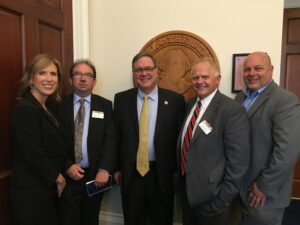At Salal, we’re always looking for ways to serve members better and further their interests. We are also continually working to support the wider credit union movement, both in our region and around the country. Recently, Salal President and CEO Russ Rosendal joined a delegation of 20 credit union advocates from around the Northwest for the “Fall Hike the Hill” in Washington D.C. Organized by the Northwest Credit Union Association (NWCUA), the spring and fall “Hike the Hill” events give the NWCUA advocacy team an opportunity to meet with our elected representatives and regulatory officials to educate them on the needs, challenges, and goals of credit unions in our region.
The September trip to Capitol Hill was Russ’ third of the year. While in D.C. this year he has met with Washington State Senators Patty Murry and Maria Cantwell, Washington Representatives Denny Heck and Adam Smith, Alaska Senator Lisa Murkowski, and an economic policy advisor to Oregon Senator Jeff Merkley. Russ has also met with officials from the Treasury Department’s Office of Community Financial Institutions.
Russ has made trips to Olympia this year as well, both as part of the NWCUA advocacy team and at the request of the Washington State Department of Financial Institutions and Washington’s Liquor and Cannabis Board.
“The NWCUA is focused on legislative advocacy and expanding the ability of credit unions to serve members,” Russ said. “We’ve been working with the Washington and Oregon legislatures to be able to allow us to do more of the same things banks can do. From a Federal standpoint, there are some restrictions on credit unions that aren’t on banks. Washington and Oregon have some restrictions as well, so the NWCUA is working to eliminate those restrictions so we can compete on a level playing field with banks.”

Cannabis banking has been a major subject of discussion on Russ’ trips to both D.C. and Olympia. Since 2014, Salal has become a national leader in establishing banking solutions for the new and rapidly growing legal cannabis industry.
“Cannabis has been a main issue we’ve addressed,” Russ said, “but there are a number of other credit union issues we’ve focused on, such as changing the regulations around business lending so we can do more affordable home loans, and helping to roll back or limit some of the new compliance regulations that are coming.” Limiting compliance regulations helps credit unions save on administrative costs—savings we can then pass on to our member-owners.
Washington’s booming cannabis industry rang up over $1.3 billion in sales (and produced more than $314 million in state taxes) this past fiscal year. It also employed over 10,000 people. But because of Federal regulations, national banks remain hesitant to provide cannabis businesses and employees with even the most basic banking services, such as a checking account. This situation also created an acute public safety issue for communities throughout Washington, as cash-only cannabis businesses found themselves with large quantities of paper currency on hand and no bank to store it safely—leaving them vulnerable to robbery and other crime. Seeing this situation developing, Salal was one of the first financial institutions in the country to take on the complex task of developing a banking solution for these businesses and employees.
In June, Russ traveled to D.C. in conjunction with the Washington Cannabusiness Association, an organization that represents Washington’s licensed and regulated cannabis businesses and promotes their interests before regulatory agencies and the state legislature. With an eye towards further helping Salal’s cannabis industry members, Russ has since joined the WACA Board of Directors.
The common threads in Russ’ advocacy efforts: a focus on putting our members first, looking out for their best interests, and finding new ways for Salal and other credit unions to provide high quality, low-cost financial services to the people of Washington State.
“We’re out there trying to fight for our members” Russ added. “Certainly, in the cannabis space, they are worried about possible Federal actions. So we’re working to help protect their investment and their employees’ jobs. And for all our members, we’re making sure we can compete equally with banks so we can offer the best products and services at great prices.”

